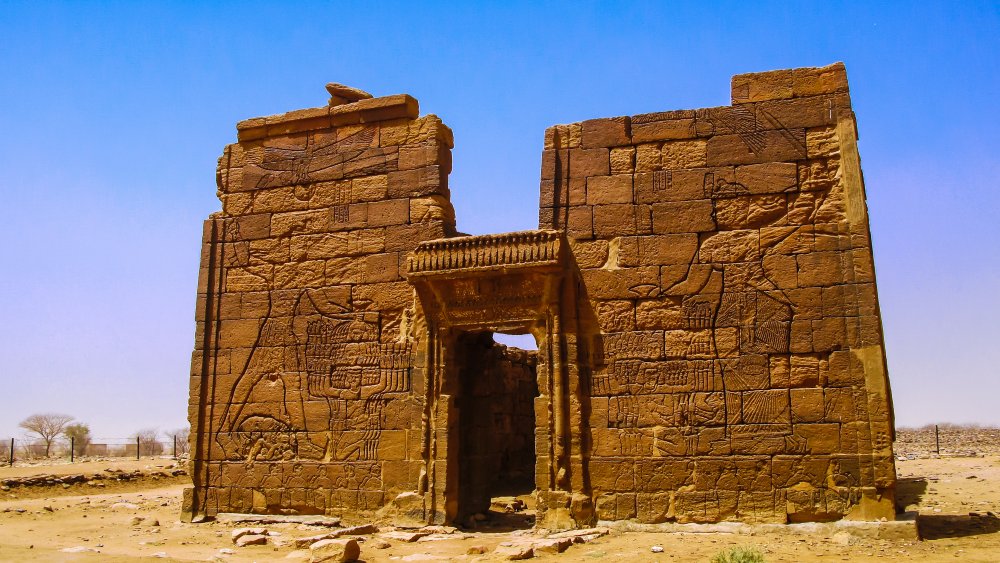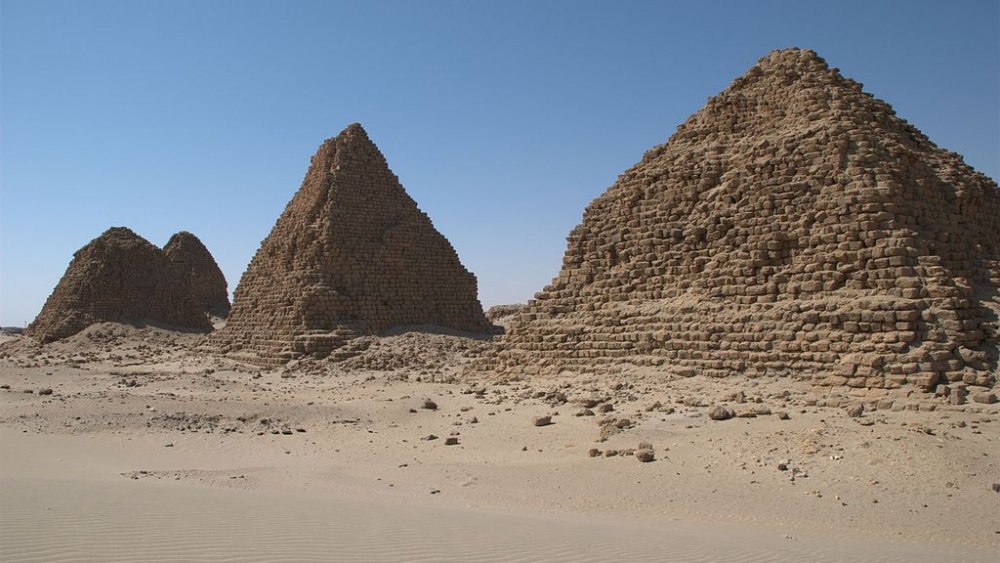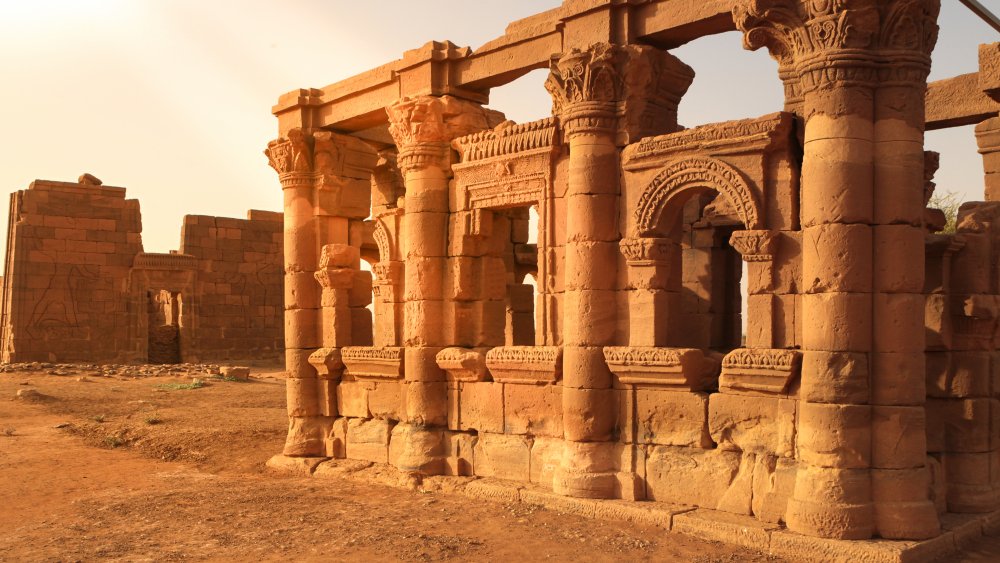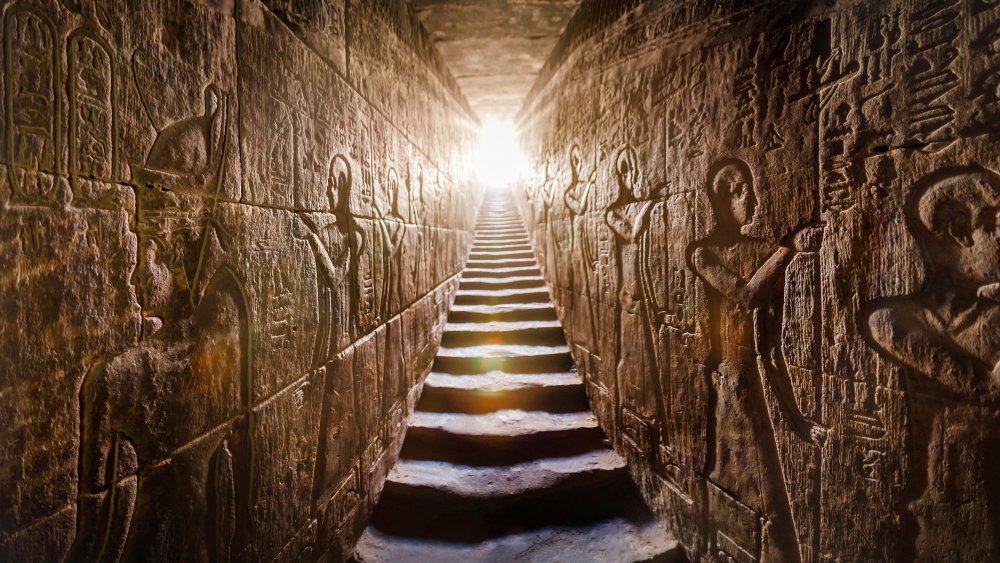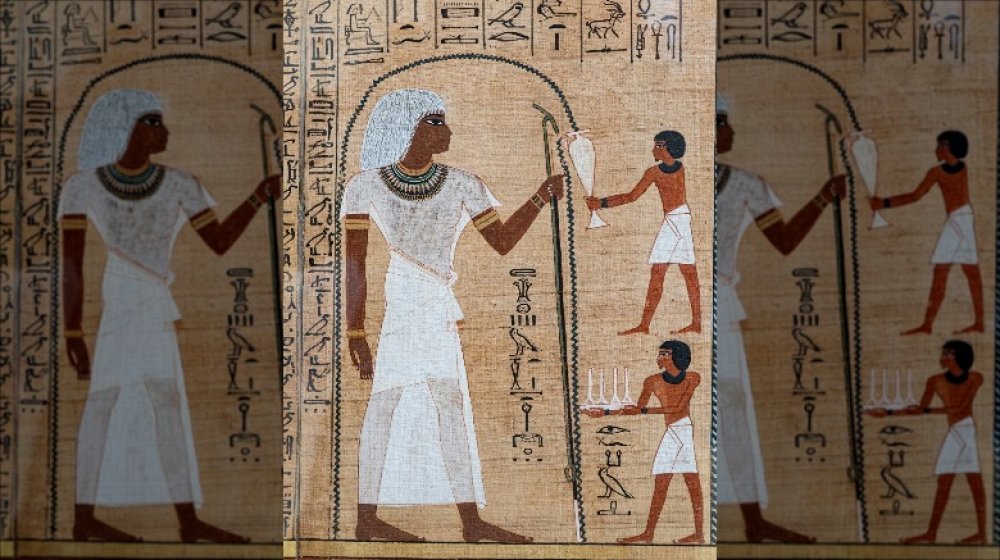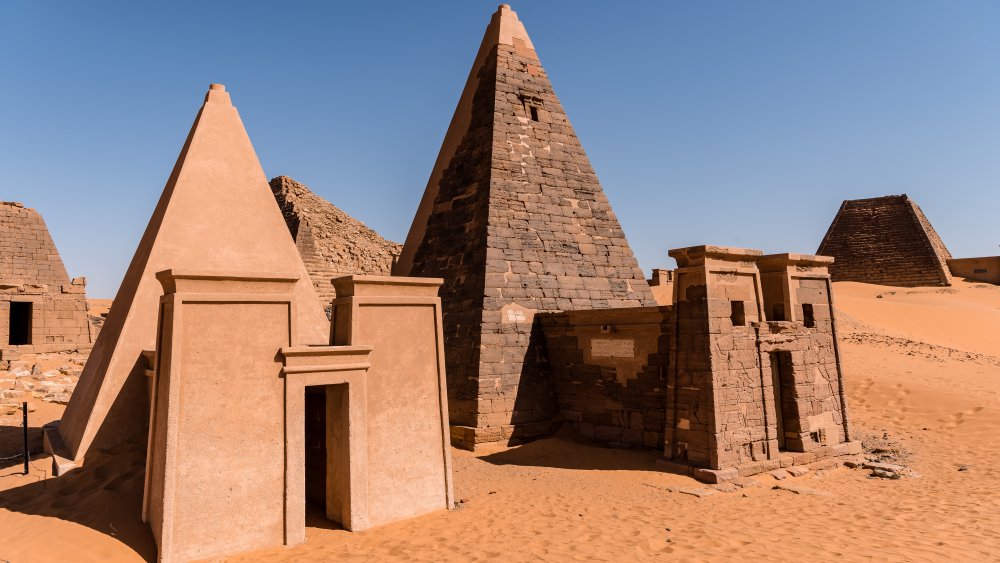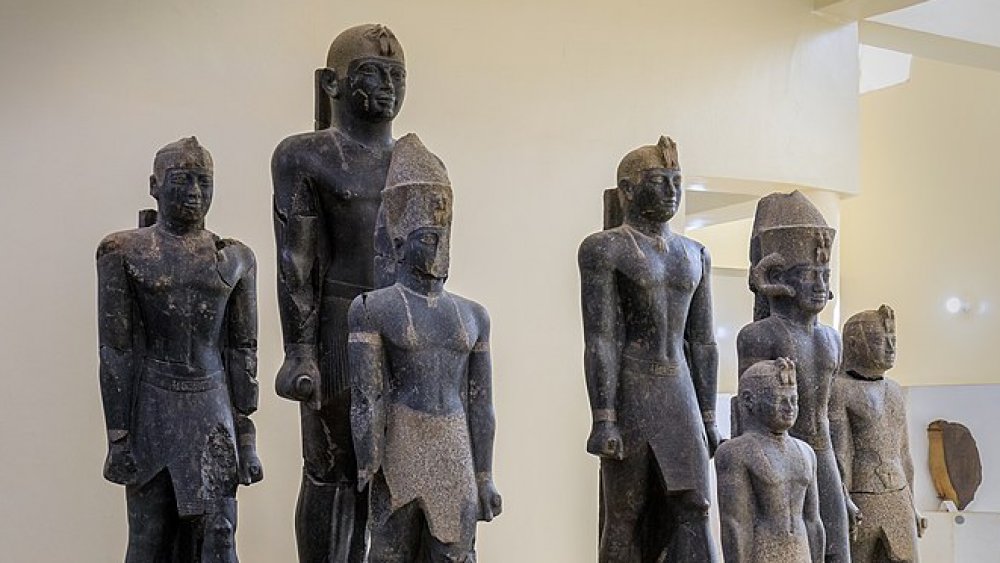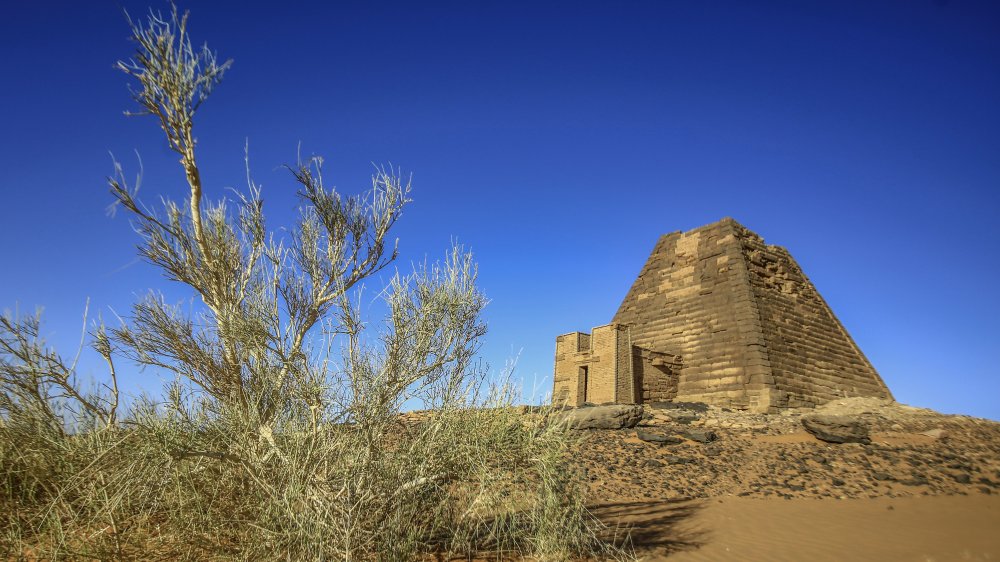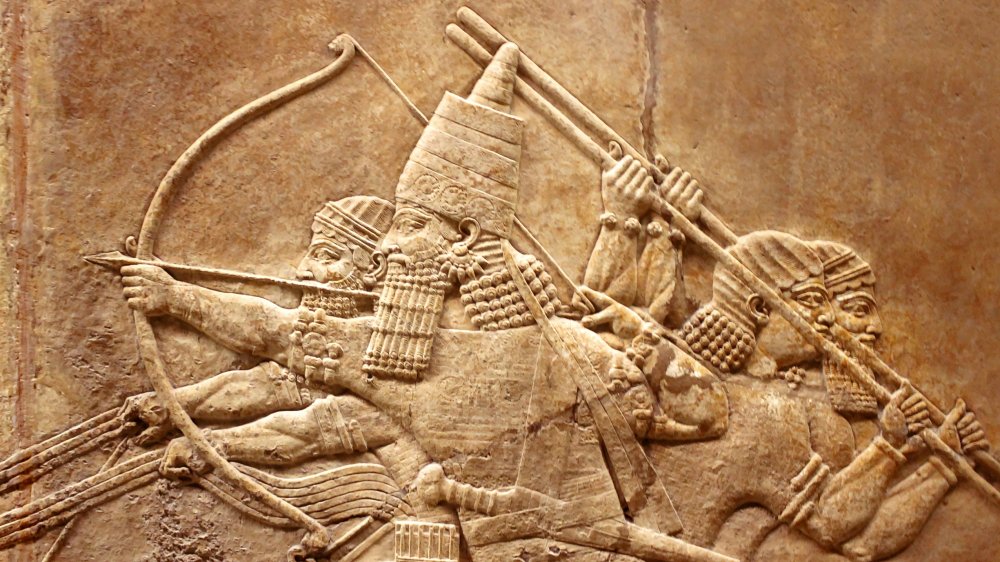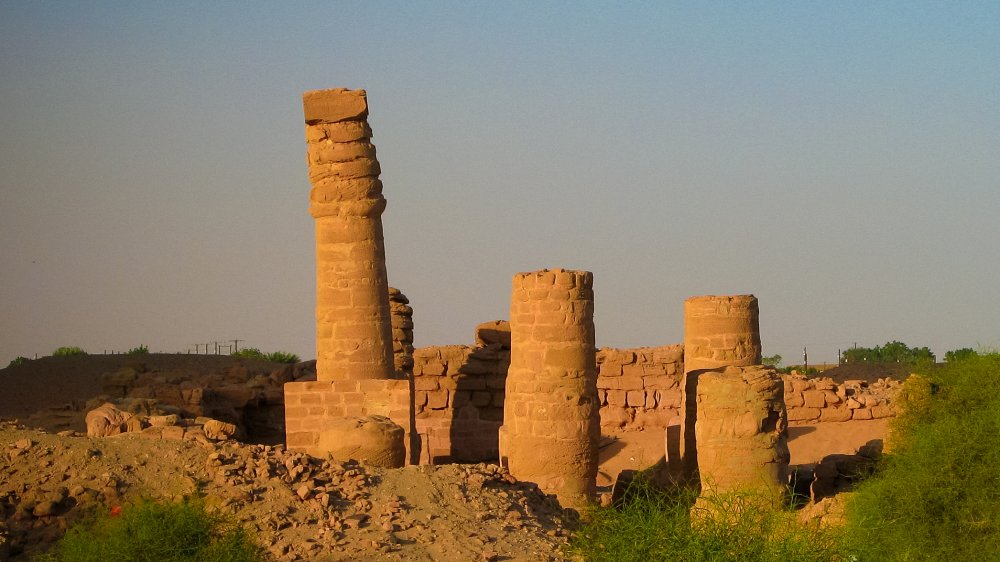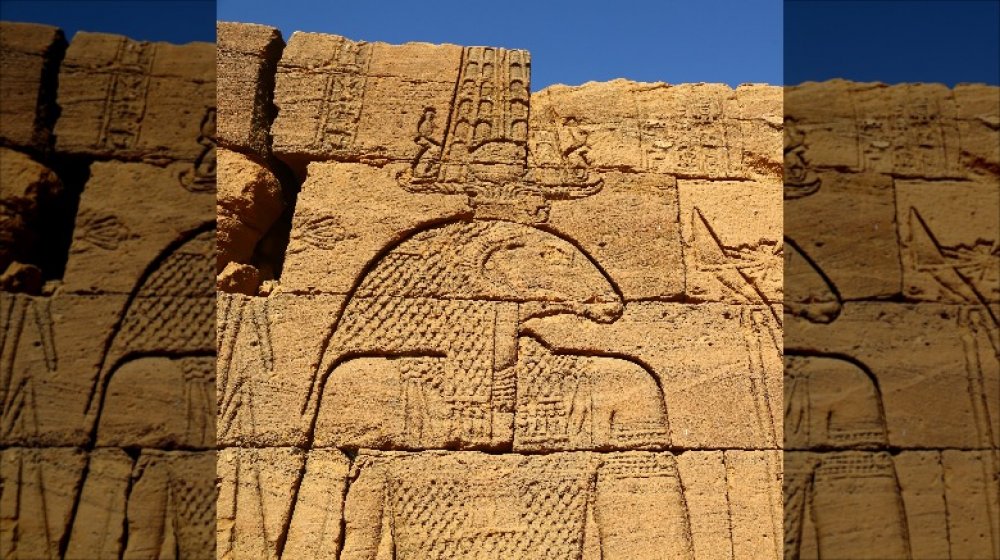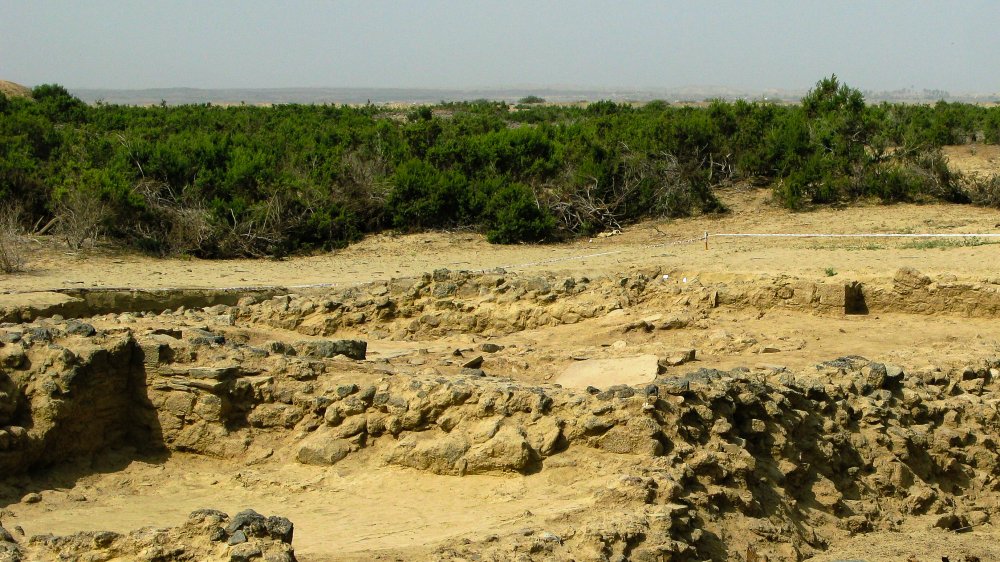The True History Of The Lost Kingdom Of Kush
The Kingdom of Kush was an ancient civilization sprawling haphazardly across Northeast Africa, just south of Ancient Egypt. But that's just geography. Unfortunately (or luckily, depending on your tolerance for complicated stories involving three-headed lion gods), the true history of the Kingdom of Kush is far more twisty, and yes, turny than a neat dotted line on a map.
Depending on which chapter of their story you read, the Kushites were both winners and losers; underdogs and overlords; aggressively expanding and defensively skulking into the historical shadows. So, steel yourself for a bracing cocktail of ancient world complexity, historical mystery, and just a hint of dramatic tragedy. Skirt the mountains of present-day Ethiopia, trudge North along the shores of the Nile, and take a sharp turn left just before you hit Egypt. Welcome to the ancient Kingdom of Kush. Prepare for a few thousand years worth of ancient world weirdness.
Who were the Kushites?
The exact genesis of the Kushites is lost to history. We know that small farming communities toiled the arid soils of modern-day Sudan around 3000 BCE. At some point, for various human-ish reasons, one of these dusty desert-dwelling folk took their first tentative steps into full kingdom-hood. Centuries passed. As related by the History Collection, our first real hint of Kush as a kingdom to be reckoned with happened almost a millennium later. Egyptian records from around 2100 BCE speak of a warlike people who fiercely resisted Egyptian rule. While that stubborn streak may have earned Kush some ancient world brownie points, it came at a cost. Kush was subdued and forced to pay tribute to Egypt for hundreds of years.
But like any decent revenge story, this first Egyptian blow to Kush was far from the final word. For well over a millennia, the people of Kush would swing back and forth between a grudging acceptance of Egyptian rule and bitter, bloodthirsty rebellion — even conquering Egypt and establishing their own dynasty of Kushite Pharaohs. And it's here that we hit on what may be the most significant defining truth of Kush. For thousands of years, Kush would define almost every aspect of its existence in counterpoint to Egypt. Whether as mortal enemies, cultural imitators, rulers, or slaves, from its dusty beginnings to the kingdom's slow decline, Kush always remained Egypt's scrappy, quasi-resentful yet oddly admiring younger brother.
Kush begins with a mystery
The Kingdom of Kush wielded remarkable influence. Even as its earliest tousles with Egypt left Kush militarily battered and financially bruised, the Kushites called the shots over a vast 750-mile portion of the Nile Valley. According to the New York Times, this may make Kush the first regional power to control North Africa. Moreover, these lands were fertile with natural resources, placing the Kingdom of Kush right in the center of the action.
Here's the mystery bit: Historians just don't get it! At this period in Kush's history, they were an agrarian people, great with horses, and likely equipped with a respectable, albeit rudimentary, military. But Kush had no organized bureaucracy to speak of. Their writing system was simple at best, and they had no major cities or trading centers to their name. The Kingdom of Kush just doesn't fit the profile of a political mover and shaker of the time — especially a power that was capable of controlling a large portion of North Africa for five centuries. While we know a lot about what Kush looked like in their golden age, their early prominence and rise to greatness baffles historians.
Kush was Egypt's poorer but more horse-centric cousin
The sprawling kingdom of Kush may have lacked Egypt's gloss and grandeur. However, being in control of such a vast territory of rich land would eventually equip the Kushites with two cultural superpowers that would serve them well right through to their glory days: Trade and horses. The Kushites were accustomed to living in vast, open spaces, and their way of life depended on horses. As the kingdom's territory and range of influence expanded, the ability to effortless range over vast distances seamed perfectly with trade's subtle dance of logistics and commerce. Equestrian prowess also meant that Kush packed a military punch well above its weight-class. While the Kushites may have lacked the military apparatus of Egypt, Kush could shift force around quickly and decisively. As JSTOR Daily puts it, "What was unobtainable through trade might have been obtained through force." Kush would come to build trading connections as far away as modern-day Morocco and perhaps even Europe.
We don't know how Kush held its massive territories together during its first millennia or so of preeminence. We do know that the Kingdom of Kush's wealth and political significance eventually left an indelible mark, forging an agile and mercenary culture that, in its heyday, could give Egypt a run for its money.
The millennia-long soap opera
The ancient kingdoms of Kush and Egypt would tousle for thousands of years, and the rise and fall of their empires had more than a hint of soap opera drama to it. Like a character playing a bit part in a leading actor's grand storyline, Kush would slink off into the cultural shadows when Egypt had a firm hand over its kingdom, and its existential threats remained just a glimmer on the horizon. In fact, for almost 500 years, Kush was reduced to little more than a small protectorate of Egypt, forced to pay tribute to the Pharaoh and hovering on the edge of complete cultural obliteration.
But then Egypt floundered, and the Kingdom of Kush burst back into the limelight, expanding its territories and trading influence through Africa. In 750 BCE, Egypt was on extremely shaky ground. The Empire had lost many of its nearby allies, and its territories were gradually being gnawed away by rivals. The Kushite king Kashta saw his opportunity and led an attack on their weakened nemesis. For the next century, a line of Kushite kings and queens ruled over Egypt. Perhaps surprisingly, this didn't spell cultural or economic disaster for Egypt. The Ancient History Encyclopedia describes this period as one of cultural blending, where Kushite Pharaohs "continued to observe Egyptian policies and respected Egyptian beliefs."
The Kushite pharaohs
The Kushite obsession with and admiration for Egypt didn't fade away when they took over as pharaonic kings and queens. In fact, during this period, far from being ruthless conquerors hell-bent on tearing Egypt's legacy down, the Nubians took on the role of caretakers. The Kushite pharaohs actively restored a string of temples and monuments throughout the Nile Valley and constructed new monuments carefully in line with traditional Egyptian beliefs and building practices. According to Heritage Daily, some of the most instantly recognizable Egyptian historic sites — Memphis, Karnak, and Jebel Barkal among them — were restored during Kushite rule of Egypt. Who knows, many of those places might have been lost if the Kushite kingdom decided to clap back and put Egypt in its place. The oddly light touch and respectful footprint of the Kushite Kingdom came to an end roughly a hundred years later, when the Assyrians drove the Kush first out of Memphis and then the remainder of their Egyptian territories.
The Kingdom of Kush retreated from Egypt and would never hold significant power there again. But that wouldn't stop them from liberally and creatively drawing from Egyptian traditions, customs, and systems of government right through their golden age and into their eventual decline. Like any good frenemy should do, Egypt sharpened and challenged Kush to better itself.
The Golden Years of Kush
The Kingdom of Kush was gradually driven south from around 600 BCE to 300 BCE, this time for good. Choosing a new capital, Meroe, the kingdom set about rebuilding and expanding its influence, free from the constant turmoil surrounding Egypt and its vast natural resources. Kush prospered, building their trading routes and amassing strong defensive forces. Some historical records suggest that Kush was imposing enough during this period that even Alexander the Great opted to leave Kush alone. By 300 BCE, Kush had officially entered its glory years. Perhaps invigorated by being further away from its flashy grown-up brother, Egypt, Kush began to double down on its cultural exploits. The kingdom shifted away from using hieroglyphs to establish its own language, Meroitic. According to Black Past, art and architecture exploded, and the Kushites appear to have been at the forefront of metallurgy, developing technologically unique ways to smelt and work iron.
Yet, for all that, even as hundreds of years passed away from Egypt's constant influence, Kush held on to a distinctly Egyptian aesthetic and way of seeing the world. New cultural influences and levels of sophistication came with Kush's enlarged influence in the region, but it seems as though those changes were skin deep. Right through to the first century BCE, Kush continued to bury its kings and queens in ornate tombs, just as it had done when Kushite pharaohs ruled Egypt.
Bizarre Kushite rituals
Kushite rituals before their gradual "Egyptianization" were unusual enough. However, by the first century BCE, Kushite traditions and rituals had become an odd amalgam of Egyptian and Kushite influences — with a delicate spicing of other cultures just to make life more interesting.
The weird soup of ideas is especially apparent in how they approached death. In the Origin of the Kingdom of Kush, historian DM Dixon describes how bodies of nobles were laid on their right side, with their head facing south — an odd distortion of the Ancient Egyptian practice of burying rulers in an east-to-west orientation. As per Egyptian custom, rulers and other prominent people were buried with all kinds of afterlife goodies, most notably gold jewelry — the ultimate afterlife insurance policy. However, nobles were also frequently buried with weaponry, in line with Libyan tradition. Just to keep things fresh, Kushite burials at this time revived the much older Kushite ritual of bed burial, and just to keep things horrifying, wives and servants were killed and buried alongside prominent Kushite noblemen. The Kingdom of Kush were imitators of other cultures, but in an entirely unique way, and always with its own unique flavor.
Were the Kushites ancient world communists?
Alongside its unusual soup of rituals and customs, the Kingdom of Kush also acquired some unconventional approaches to maintaining their economy. Historians theorize that the Kushite economy was equipped with checks and balances for spreading the wealth around, maintaining a certain level of equality between the rich and the poor. The system may almost have resembled the ancient world equivalent of communism, albeit with a smattering of ancient gods thrown into the mix.
The Kushite kingdom's approach to spreading wealth seemed to have operated on a few levels. Historian Randi Haaland describes redistribution as a tool for maintaining a strong sense of social cohesion. Kushite kings would "mediate the flow of goods and services internally between different occupational specialists ... as well as externally between different kingdoms." This generated a strong sense of loyalty to Kush, as well as a handy network of debts to cash in further down the line. The system may also have provided the ancient world equivalent of a social welfare safety net, with surplus produce and income from taxes extended to the most deprived people within the kingdom.
Which just goes to show you that the ancient world is confusing to modern sensibilities. Sure, if you happened to be part of the royal court, you'd end up buried alongside the king, but that same culture saw it as crucial to take care of the poor and needy.
Assyria, and the beginning of the end for Kush
For a considerable chunk of both civilization's histories, Kush and Egypt were locked in a semi-predictable orbit. However, a deadly rival would, in time, completely up-end that balance. At first, relations with Assyria were peaceful. With strangely modern echoes of present-day international relations, when the kingdom of Kush was solidifying its reign in Egypt in 700 BCE, a steady flow of diplomatic gifts and gestures of mutual support flowed back and forth between Kush and Assyria. University College London describes how Kush even volunteered to extradite a rebel king (who refused to pay tribute — a real no-no in the ancient world) back to Assyria's not-so-loving embrace. But, to understate things a little, relations between Assyria and Kush would cool. Assyria invaded Kush. Although their forces are thought to have been evenly matched in those first few encounters, Assyria's formidable armies eventually pushed the Kushite kingdom out of Egypt, and far to the south.
Kush's defeat by the Assyrians wasn't just a loss of territory. This was a different situation to the ebb and flow the kingdom had experienced while butting heads with its big brother, Egypt. Kush would go on to great things, but Assyria permanently changed Kush by decapitating it from the Egyptian culture it defined itself against.
Rome, and the end of the end
One day in the first century BCE, the sturdy freight train of Kush would hit the unstoppable cement mixer of the Roman Empire, and the slow death of the Kushite Kingdom began in earnest. The first blow is thought to have been struck by Kush, who sacked Aswan, a town bordering Kush and the Roman Empire. The Romans, not known for taking territorial incursions lying down, retaliated by sending a military expedition into the heart of the Kushite Kingdom. The Global Egyptian Museum records the capital, Napata, was captured in 22 BCE, with a permanent garrison established there to maintain Roman rule.
History is clouded on precisely what happened next, but we know that Kush sent a large force to reclaim the capital. Nasty battles ensued, seemingly with no clear winner. Ultimately, though, Kush sued for peace, and the prefect of Roman-occupied Egypt, Petronius, accepted — a sure sign that, if nothing else, the Romans gave Kush props as an indomitable and worthy foe (to use the dramatic History Channel lingo). Ultimately, the once majestic, if oddly quirky, Kingdom of Kush would become a humble client state of the Roman Empire, an insignificant cog in the greatest machine of civilization the ancient world had seen. The Kingdom of Kush had come and gone, their time of empire and dominion forever lost.
The war of ideas
The Kushite religion was colorful, spicy, and exotic. A polytheistic and pharaonic religion — similar in many of its dramatic beats to Ancient Egypt — the Kush believed in a pantheon of colorful animal gods, and that their rulers were on good speaking terms with these beings from beyond. Ever the innovators, though, the Kush introduced a fun bunch of add-on deities, most of them likely drawn from the civilization's vibrant trade connections throughout Southern Africa. Apedemak stands out as a lively example of a Kushite flavored god. Apedemak was a three-headed lion warrior god who appears to have gotten his jollies from snacking on enemy kings and (predictably enough) leading Kushite warriors to victory.
As the Roman grip on Kush tightened, its colorful god soup was slowly replaced. Finally — tragically even — after millennia of seeing the world through an odd distortion of Ancient Egyptian eyes, the Kushite view on the world slowly crumbled. Kush had already faded as a power. But now, after over eight millennia, Kush culture cracked, crumbled, and faded away.
The last days of Kush
The final moments of the Kingdom of Kush are a matter of historical debate, with only a few puzzle fragments to fill in the gaps. We know that by the second century CE, Kushite royal tombs shrunk in size and were less lavishly appointed. Once prodigious builders of monuments, these gradually slowed as well, until their construction petered out altogether. As recounted in Ancient History Encyclopedia, in 330 CE, the meager remaining Kushite territories in Meroe were conquered by the Axumites, an ancient warlike kingdom centered in present-day Eritrea. Historical records paint a grim picture of poverty, overgrazed farming lands, and surrounding areas that were extensively deforested and unfit for agriculture. By the time the Axumite army arrived, the Kushite Kingdom was just a shadow, a people already on the edge of extinction.
Endings in the movies are usually catastrophic and sudden, particularly for significant characters with the weight of a grand and epic story resting on their shoulders. History is rarely quite so dramatic, and the last days of Kush are no exception. They left history's stage, not with a bang but a whimper.
